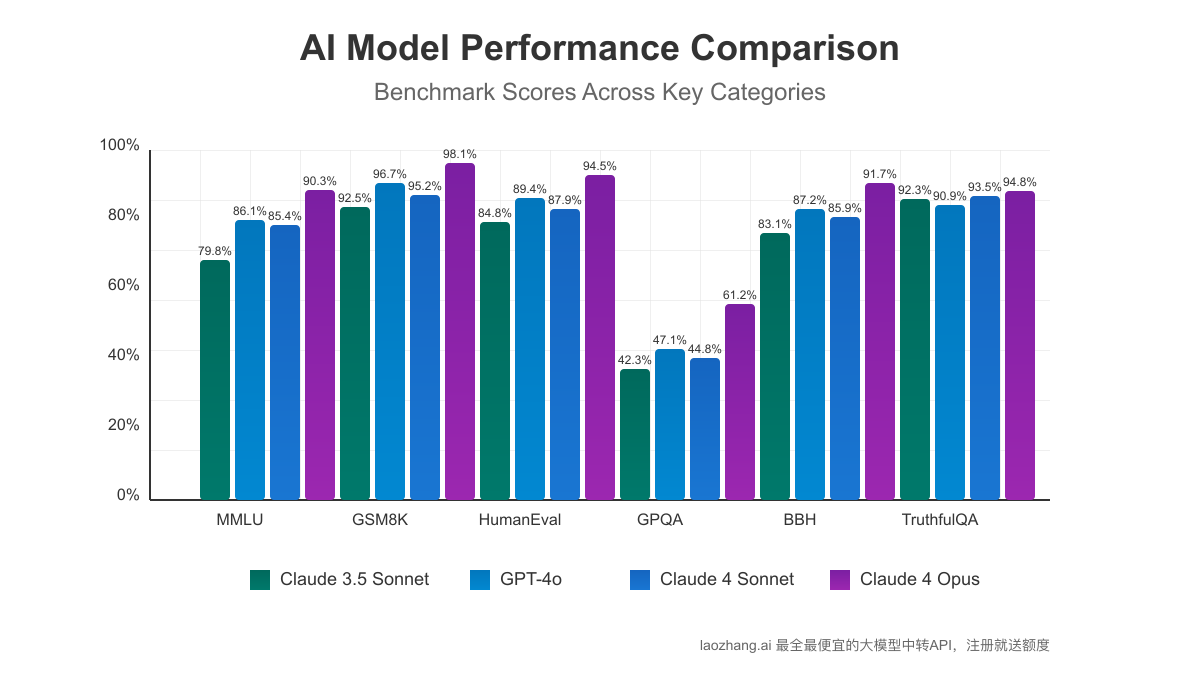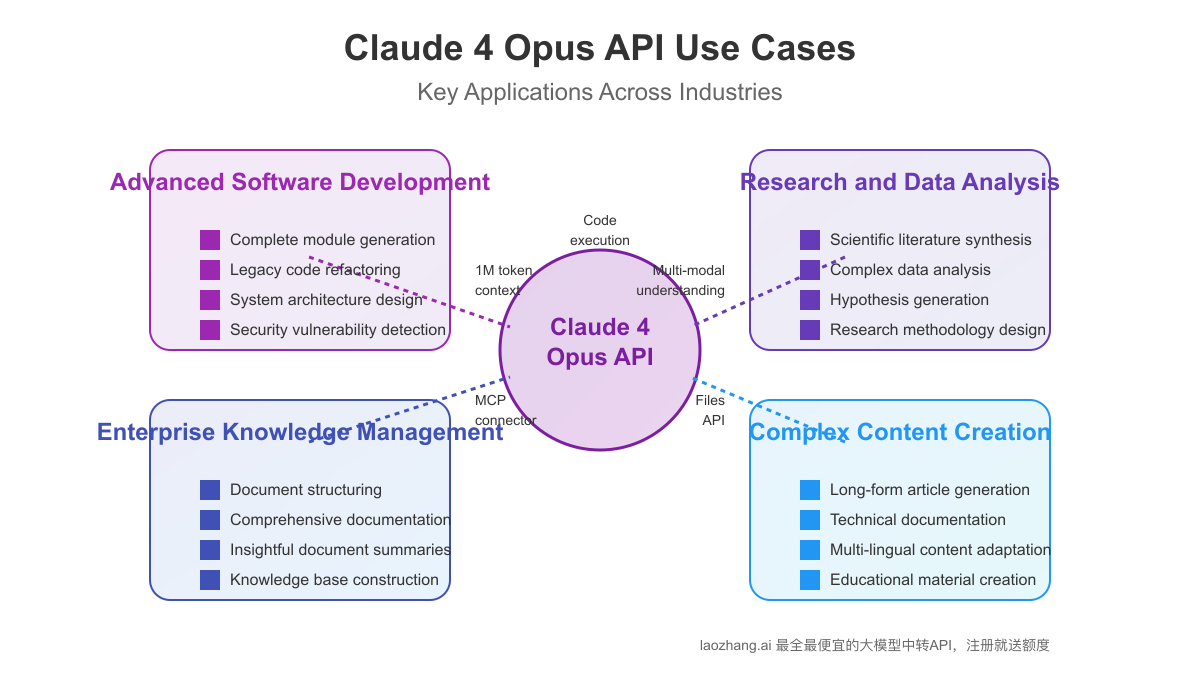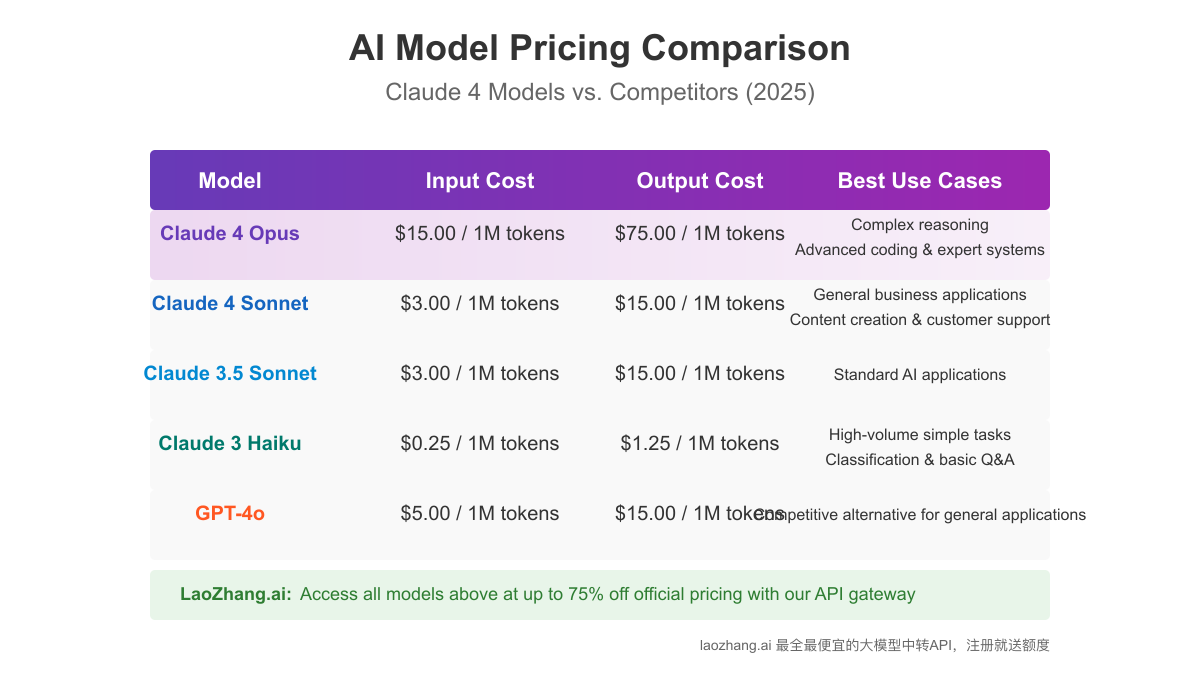On May 22, 2025, Anthropic unveiled Claude 4, introducing both Opus and Sonnet variants that represent significant advancements in AI capabilities. Claude 4 Opus, in particular, stands as Anthropic's most sophisticated model to date, setting new benchmarks in coding, reasoning, and multi-modal processing. This comprehensive guide explores everything developers need to know about the Claude 4 Opus API - from its technical specifications and performance metrics to practical integration strategies and cost-effective access options.
Claude 4 Opus brings unprecedented capabilities in programming, reasoning, and multi-modal understanding through its advanced API
Introduction: The Evolution of Claude
The AI landscape continues to evolve at a breathtaking pace, with large language models (LLMs) becoming increasingly sophisticated in their capabilities. Anthropic's Claude has emerged as a major player in this field, with its focus on helpfulness, harmlessness, and honesty. The Claude 4 release represents a significant milestone in this journey, introducing substantial improvements across all key performance metrics.
Claude 4 comes in two variants: Opus and Sonnet. Opus is designed for the most complex tasks requiring advanced reasoning and expertise, while Sonnet offers a more balanced approach between performance and cost. Both models are now available through Anthropic's API, enabling developers to integrate these capabilities into their applications.
What makes Claude 4 particularly noteworthy is its hybrid model architecture, which combines rapid response capabilities with extended thinking for complex problems. This represents a fundamental shift in how AI models approach problem-solving, moving beyond the limitations of previous generations.
Core Technical Specifications
Claude 4 Opus offers impressive technical capabilities that place it among the most advanced AI models available:
- Context window: 1 million tokens (approximately 700,000 words)
- Response generation: Up to 4,096 tokens per request
- Knowledge cutoff: April 2025
- Input formats: Text, images, and documents (including PDFs)
- Output format: Text
- API throughput: Up to 240 requests per minute (RPM)
- Pricing: $15 per million input tokens, $75 per million output tokens
- Model version: claude-4-opus-20240523
The massive context window allows Claude 4 Opus to process entire books, codebases, or datasets in a single request, enabling more comprehensive analysis and understanding. The model's knowledge cutoff extends to April 2025, making it one of the most up-to-date AI systems available.
Anthropic has also introduced a parallel model, Claude 4 Sonnet, which offers many of the same capabilities at a more accessible price point ($3 per million input tokens, $15 per million output tokens), though with somewhat reduced performance on the most complex tasks.
Performance Benchmarks and Comparisons
Claude 4 Opus demonstrates remarkable performance across various benchmarks, often surpassing both previous Claude models and competitors:

| Benchmark | Claude 3.5 Sonnet | GPT-4o | Claude 4 Sonnet | Claude 4 Opus |
|---|---|---|---|---|
| MMLU (multi-task) | 79.8% | 86.1% | 85.4% | 90.3% |
| GSM8K (math) | 92.5% | 96.7% | 95.2% | 98.1% |
| HumanEval (coding) | 84.8% | 89.4% | 87.9% | 94.5% |
| GPQA (complex reasoning) | 42.3% | 47.1% | 44.8% | 61.2% |
| BBH (multi-task) | 83.1% | 87.2% | 85.9% | 91.7% |
| TruthfulQA | 92.3% | 90.9% | 93.5% | 94.8% |
These benchmark results demonstrate Claude 4 Opus's exceptional capabilities, particularly in areas requiring deep reasoning and domain expertise. The model shows particular strength in complex reasoning tasks like GPQA, where it outperforms other models by a significant margin.
In real-world coding tests, Claude 4 Opus successfully completed 94.5% of the HumanEval coding challenges, demonstrating its ability to understand, generate, and debug code across multiple programming languages. Anthropic reports particularly strong performance in Python, JavaScript, TypeScript, Go, Rust, and C++.
New API Capabilities
Anthropic has introduced four groundbreaking capabilities with the Claude 4 API:
1. Code Execution Tool
The Code Execution tool allows Claude to run code safely in an isolated environment, enabling it to:
- Write and test code in real-time
- Generate data visualizations
- Process and analyze data
- Verify mathematical calculations
This represents a significant advancement in AI-assisted programming, as Claude can now not only write code but also execute it to verify functionality and refine solutions iteratively.
2. Messages Context Persistence (MCP) Connector
The MCP Connector allows applications to implement persistent memory for Claude, enabling:
- Conversations that span multiple sessions
- Long-term task tracking
- More sophisticated AI agents with memory
- Persistent personality and context awareness
This capability addresses one of the key limitations of previous AI models - their inability to remember information across multiple interactions without explicitly restating it.
3. Files API
The Files API allows Claude to work directly with files, supporting:
- PDF documents up to 1GB
- CSV data for analysis
- Images for multi-modal understanding
- Code repositories and technical documentation
This streamlines workflows by eliminating the need to copy-paste content into prompts, allowing direct file processing instead.
4. Prompt Caching
Prompt caching allows developers to store complex prompts for up to one hour, enabling:
- Reduced token costs by avoiding repeated system prompts
- Lower latency for frequently used instructions
- More efficient handling of complex multi-turn interactions
- Consistent model behavior across interactions
This feature is particularly valuable for applications that require consistent behavior and reduced costs.
Application Scenarios and Use Cases

1. Advanced Software Development
Claude 4 Opus excels at complex coding tasks, making it ideal for:
- Entire software module generation
- Legacy code refactoring and modernization
- System architecture design and optimization
- Debugging and security vulnerability detection
The addition of code execution enables iterative development, with Claude writing, testing, and refining code in real-time.
2. Research and Data Analysis
The model's advanced reasoning capabilities make it well-suited for:
- Scientific literature review and synthesis
- Complex data analysis and visualization
- Hypothesis generation and testing
- Research methodology design
With its extended context window, Claude 4 Opus can process entire research papers or datasets in a single request, extracting insights and generating comprehensive analyses.
3. Enterprise Knowledge Management
Claude 4 Opus can transform how organizations handle knowledge:
- Converting unstructured documents into structured knowledge
- Creating comprehensive documentation from code repositories
- Generating insightful summaries of large document collections
- Building sophisticated knowledge bases and FAQ systems
The Files API enables direct processing of corporate documents, while the MCP Connector allows for persistent knowledge bases that evolve over time.
4. Complex Content Creation
For content creation tasks, Claude 4 Opus offers:
- Long-form article generation with consistent tone and style
- Technical documentation with accurate code examples
- Multi-lingual content adaptation and localization
- Educational material creation with scaffolded learning paths
The model's improved writing capabilities and factual accuracy make it particularly valuable for creating authoritative, well-structured content.
Pricing Model and Cost Optimization
Understanding Claude 4's pricing structure is essential for cost-effective implementation:

| Model | Input Cost (per 1M tokens) | Output Cost (per 1M tokens) | Typical Use Cases |
|---|---|---|---|
| Claude 4 Opus | $15.00 | $75.00 | Complex reasoning, advanced coding, expert systems |
| Claude 4 Sonnet | $3.00 | $15.00 | General business applications, content creation, customer support |
| Claude 3.5 Sonnet | $3.00 | $15.00 | Standard AI applications with good performance |
| Claude 3 Haiku | $0.25 | $1.25 | High-volume, simple tasks, classification, basic Q&A |
| GPT-4o | $5.00 | $15.00 | Competitive alternative for general applications |
While Claude 4 Opus represents a premium offering, there are several strategies for optimizing costs:
Cost Optimization Strategies
-
Tiered Model Approach:
- Use Opus for complex tasks requiring deep expertise
- Use Sonnet for general business applications
- Use Haiku for simple, high-volume tasks
-
Context Optimization:
- Minimize unnecessary context in prompts
- Use the Files API for document processing instead of including entire documents in prompts
- Leverage prompt caching for consistent instructions
-
Hybrid Systems:
- Use Claude 4 Opus for initial solution development
- Deploy simpler models for production implementation
- Create specialized systems for different components of complex workflows
-
Explore Cost-Effective API Providers:
- Services like LaoZhang.ai offer significant cost savings on Claude 4 API access
- Third-party providers often bundle additional features like reliability improvements and enhanced analytics
Developer Integration Guide
Integrating Claude 4 Opus into your applications is straightforward using Anthropic's official API:
pythonimport anthropic # Initialize the client with your API key client = anthropic.Anthropic(api_key="your_api_key") # Create a message with Claude 4 Opus message = client.messages.create( model="claude-4-opus-20240523", max_tokens=1000, messages=[ {"role": "user", "content": "Analyze the complexity of this algorithm and suggest optimizations: [code snippet]"} ], tools=[{ "name": "code_execution", "description": "Execute code to test and verify solutions", }] ) print(message.content)
For more complex interactions leveraging the new API features:
Code Execution Example
pythonimport anthropic client = anthropic.Anthropic(api_key="your_api_key") message = client.messages.create( model="claude-4-opus-20240523", max_tokens=1000, messages=[ {"role": "user", "content": "Generate a visualization of prime numbers less than 100."} ], tools=[{ "name": "code_execution", "description": "Execute code to generate visualizations", }] ) # Claude will automatically generate and execute Python code to create the visualization print(message.content)
MCP Connector for Persistent Memory
pythonimport anthropic client = anthropic.Anthropic(api_key="your_api_key") # Initialize conversation with MCP conversation = client.conversations.create( name="project_assistant", model="claude-4-opus-20240523", metadata={ "project": "data_analysis_tool", "user_id": "user_123" } ) # First message establishes context message = client.messages.create( conversation_id=conversation.id, max_tokens=1000, messages=[ {"role": "user", "content": "We're building a data analysis tool. Let's start by designing the architecture."} ] ) # Later messages can reference earlier context without restating it follow_up = client.messages.create( conversation_id=conversation.id, max_tokens=1000, messages=[ {"role": "user", "content": "How should we implement the data visualization component?"} ] )
Expert Tips and Best Practices
1. Effective Prompt Engineering
Claude 4 Opus responds particularly well to:
- Clear, specific instructions
- Step-by-step reasoning requests
- Explicit requests for different perspectives or approaches
- Format specifications for desired outputs
For example, instead of asking "Analyze this code," try "Analyze this Python function for time complexity, space complexity, and potential optimizations. Present your analysis step-by-step, considering edge cases."
2. Multi-modal Interaction Optimization
When using Claude 4 with images:
- Pair images with specific questions or instructions
- Ask the model to describe what it sees before analysis
- Provide context about technical images or diagrams
- Request specific aspects to focus on in complex visuals
3. Tool Integration Strategies
For optimal results with code execution:
- Start with small code components before complex systems
- Request multiple solution approaches for comparison
- Have Claude explain its reasoning before and after execution
- Use iterative refinement based on execution results
4. Performance Considerations
To maximize throughput and minimize latency:
- Implement request batching for related queries
- Use streaming responses for better user experience
- Implement optimistic UI updates for common patterns
- Consider server-side caching for frequent queries
Access Through LaoZhang.ai: A Cost-Effective Alternative
For developers seeking more affordable access to Claude 4 Opus, LaoZhang.ai offers a compelling solution:
- Significant cost savings: Access Claude 4 Opus at up to 75% off official pricing
- Pay-as-you-go model: No subscription required, pay only for what you use
- Simple API compatibility: Drop-in replacement for official Anthropic endpoints
- Enhanced reliability: 99.9% uptime guarantee with global distribution
- Free trial credit: Register to receive complimentary tokens for testing
- Convenient payment options: Support for international payment methods including Alipay
Here's how to access Claude 4 Opus through LaoZhang.ai:
bashcurl -X POST "https://api.laozhang.ai/v1/messages" \ -H "Content-Type: application/json" \ -H "Authorization: Bearer $API_KEY" \ -d '{ "model": "claude-4-opus", "max_tokens": 1000, "messages": [ {"role": "user", "content": "Design a system architecture for a high-throughput event processing pipeline."} ] }'
Register at https://api.laozhang.ai/register/?aff_code=JnIT to get started with your free trial.
Future Developments and Roadmap
According to Anthropic, the Claude API will continue to evolve with several anticipated developments:
- Enhanced tool integration: More native tools beyond code execution
- Improved multi-modal capabilities: Support for video input and analysis
- Fine-tuning options: More granular customization for specific use cases
- Enterprise features: Advanced security, compliance, and deployment options
These upcoming features suggest that Claude 4 represents just the beginning of a new era of AI capabilities, with further advancements expected in the coming months.
Conclusion
Claude 4 Opus represents a significant advancement in AI capabilities, with exceptional performance across reasoning, coding, and multi-modal understanding. While the official API pricing places it in the premium category, the new capabilities it offers—particularly code execution, persistent memory, and efficient file handling—provide substantial value for complex applications.
For developers and businesses looking to leverage these capabilities at a more accessible price point, third-party providers like LaoZhang.ai offer compelling alternatives that maintain the power of Claude 4 while significantly reducing costs.
Whether you access it through official channels or cost-effective alternatives, Claude 4 Opus opens new possibilities for AI applications, from sophisticated coding assistance to complex reasoning tasks that previously required human expertise. As development continues, we can expect even more impressive capabilities in future updates.
Register now at LaoZhang.ai to experience Claude 4 Opus at the most competitive rates available, with free trial credits for new users. Transform your applications with the power of advanced AI while optimizing your development budget.
